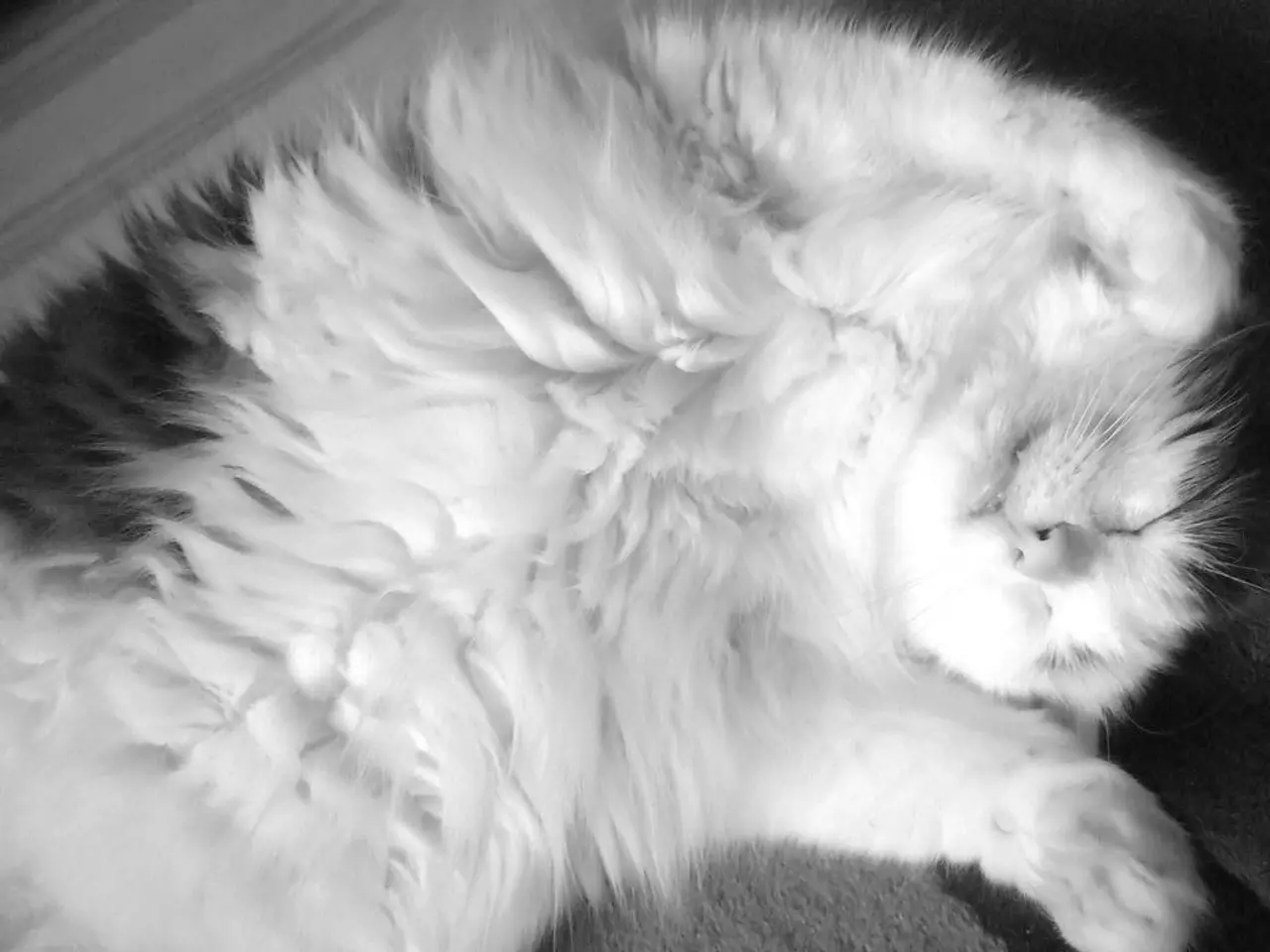Cat Snores: Annoying, Adorable, or a Warning Sign?
Cats, much like humans, can sometimes make noise while they sleep, and snoring is a common occurrence among feline friends. However, understanding the causes behind cat snoring can help pet owners determine when it's time to consult a vet.
Cats may snore due to various factors, including breed, anatomy, sleeping position, obesity, respiratory infections or allergies, foreign objects, environmental factors, and age.
Flat-faced (brachycephalic) breeds, such as Persians, Himalayans, and Exotic Shorthairs, are more prone to snoring due to their shortened nasal passages and airway structure, which can restrict airflow and cause snoring sounds. Cats that sleep in certain positions, particularly curled very tightly or sprawled flat, may also experience temporary airway compression that results in snoring.
Overweight or obese cats often have excess fat deposits around the neck and throat, which can narrow the airway and increase snoring. Inflammation, mucus buildup, or nasal discharge caused by infections or allergies can lead to snoring, especially if accompanied by other symptoms like sneezing or coughing. Cats sometimes inhale small foreign bodies that can obstruct nasal passages, resulting in sudden onset snoring that requires veterinary attention.
Changes in air quality, humidity, or allergens can affect nasal passages, making snoring more likely during certain times of the year or in particular environments. Older cats may snore more frequently due to relaxed muscle tone in the throat and airway.
Most cases of cat snoring are harmless, especially in brachycephalic breeds or when due to temporary factors like sleep position. However, there are circumstances where veterinary consultation is warranted:
- **Sudden Onset of Snoring:** If your cat begins snoring suddenly or the pattern changes noticeably, this could indicate a new obstruction, infection, or illness and should be assessed by a vet. - **Loud or Persistent Snoring:** While occasional, gentle snoring is often normal, loud or persistent snoring—especially in cats that previously did not snore—may be a sign of underlying respiratory disease, allergies, or other health issues. - **Accompanying Symptoms:** If snoring is accompanied by sneezing, coughing, nasal discharge, labored breathing, lethargy, loss of appetite, or any other signs of respiratory distress, seek veterinary care promptly. - **Respiratory Distress:** Any sign that your cat is struggling to breathe, panting, or experiencing open-mouthed breathing (which is unusual in cats) is an emergency and requires immediate veterinary attention. - **Breed-Specific Concerns:** For brachycephalic breeds, regular veterinary checks are advisable to ensure their airway anatomy is not causing serious breathing difficulties.
In summary, most snoring in cats is benign, but sudden onset, loud, or persistent snoring, or snoring accompanied by other respiratory symptoms, warrants veterinary evaluation to rule out serious conditions such as infections, obstructions, allergies, or chronic diseases like asthma. Routine check-ups are especially important for brachycephalic breeds to monitor airway health.
- The shortened nasal passages and airway structure of brachycephalic breeds, such as Persians, Himalayans, and Exotic Shorthairs, might be attributed to technology and science, as breeding practices have been influenced by these fields, leading to their distinctive features.
- In some cases, snoring in cats can be caused by environmental factors, like changes in air quality or humidity. These factors are closely related to the health-and-wellness of cats, as the quality of their living environment can significantly impact their respiratory health.




